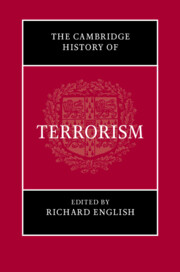Book contents
- The Cambridge History of Terrorism
- The Cambridge History of Terrorism
- Copyright page
- Contents
- Figures
- Tables
- Acknowledgements
- Contributors
- Part I Introduction
- Part II Frameworks and Definitions
- Part III Historical Case Studies in Terrorism
- Part IV Thematic Essays
- 20 ‘September 12 Thinking’
- 21 The History of Terrorism and Communication
- 22 Terrorism, History and Religion
- 23 History, Terrorism and the State
- 24 Into the Labyrinth
- 25 Gender Politics and Terrorist Histories
- Part V Conclusion
- Index
- References
20 - ‘September 12 Thinking’
The Missing Histories of Counterterrorism
from Part IV - Thematic Essays
Published online by Cambridge University Press: 07 May 2021
- The Cambridge History of Terrorism
- The Cambridge History of Terrorism
- Copyright page
- Contents
- Figures
- Tables
- Acknowledgements
- Contributors
- Part I Introduction
- Part II Frameworks and Definitions
- Part III Historical Case Studies in Terrorism
- Part IV Thematic Essays
- 20 ‘September 12 Thinking’
- 21 The History of Terrorism and Communication
- 22 Terrorism, History and Religion
- 23 History, Terrorism and the State
- 24 Into the Labyrinth
- 25 Gender Politics and Terrorist Histories
- Part V Conclusion
- Index
- References
Summary
In several respects, history is at the forefront of terrorism scholarship through challenging the domination of the social sciences and conventional wisdoms of the present that do not hold up to scrutiny once historicised. Moreover, historical research frequently accomplishes this by accessing a rich supply of primary source material that is more readily available than contemporary records because the passage of time has rendered it less sensitive. Despite these factors, there remains a broader impression, especially among governments, that terrorism’s past has little relevance to its present, hence the placing of resources into contemporary social science research instead of into the historicising of terrorism. As with terrorism, counterterrorism is not solely a phenomenon of the present day. It has a history as long as that of terrorism. Whether it is in the form of counterterrorism methods, such as the reliance on human intelligence, the difficulty in striking a balance between civil liberties, human rights and security or how to define the threat needing to be countered, the issues of the twenty-first century are, to varying extents, re-emergent, not nascent. As scholars make increasing inroads into excavating the difficult and convoluted history of terrorism, the need to exhume another inherent element of the complex equation, counterterrorism responses in both the micro and macro, grows ever greater.
- Type
- Chapter
- Information
- The Cambridge History of Terrorism , pp. 503 - 523Publisher: Cambridge University PressPrint publication year: 2021

